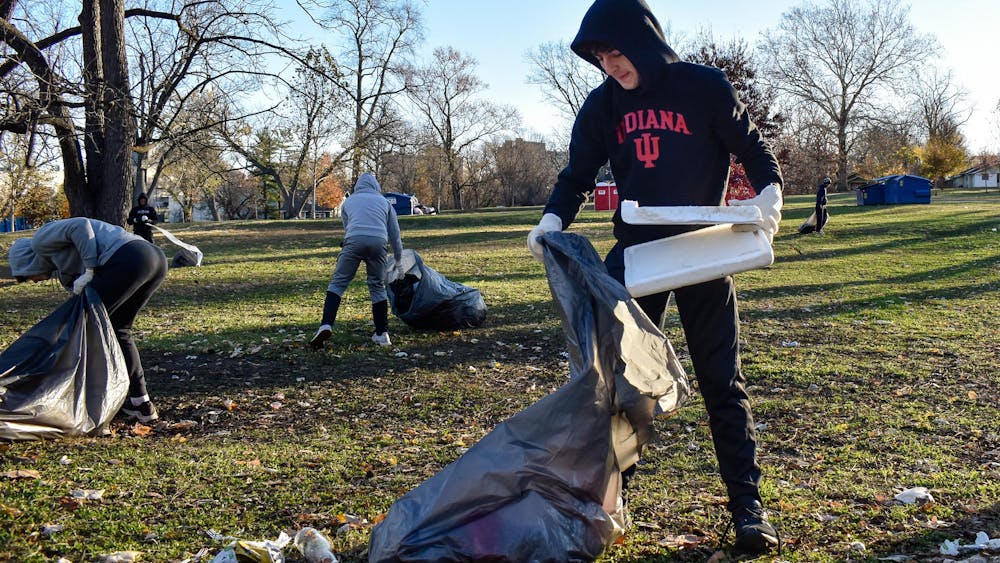IU sophomore Paul Gardner does not know who etched the word “fag” into his Wright Quad dorm room door last fall. Even if he did, there’s no legal action Gardner could take to prosecute the offender for a hate crime due to Indiana’s current lack of hate crime legislation. \nDespite efforts earlier this year by Indiana legislators to pass a “bias crime bill,” Indiana remains one of only five states in the nation without hate crime laws. That is something Indiana State Rep. Greg Porter, D-Indianapolis, is still committed to changing. \nWith recent heightened racial tensions both locally and nationally caused by several incidents, including a noose found hanging at Indiana State University, several homeless beatings in northern Indiana and the now notorious “Jena 6” controversy, Porter said Indiana needs to address hate crime issues.\nIn February, Porter authored the original legislation that would have punished someone who committed the offense if they knowingly selected the victim because of their “color, creed, disability, national origin, race, religion, sexual orientation, gender identity, or sex,” according to the bill’s text. \nRepublicans, led by Rep. Jackie Walorski, R-Lakeville, shot down that bill, but Porter told the Indiana Daily Student on Monday that he planned to reintroduce a version of the hate crime bill in December for the legislature’s upcoming session. Walorski had added a anti-abortion amendment to the first bill along with an amendment that made killing police officers a hate crime. Controversy surrounding those additions eventually killed the legislation, Walorski said. \nWhile the only change to Porter’s soon-to-be introduced bill will be to now include the attacking of homeless people as a hate crime, he said recent events occurring around the nation will help fuel the legislation’s success. \nFirst Amendment advocacy groups such as the American Civil Liberties Union of Indiana oppose such legislation because they claim it restricts free speech, but Porter said he will continue to push the legislation forward\n“(Indiana is) one of five states without a hate crime legislation, so the 45 other states are wrong?” Porter questioned.
A national debate \nDespite Porter’s desire for Indiana to adopt hate crime legislation, some federal politicians are still trying to expand a 1969 federal hate crime law, which they view as outdated. That law does not include groups such as gays and the disabled. \nAfter 21-year-old University of Wyoming student Matthew Shepard was killed in 1998 in what was regarded as a gay hate crime, public outcry forced politicians to react. The Matthew Shepard Act or Local Law Enforcement Hate Crimes Prevention Act of 2007, aims to extend laws to include previously ignored groups. That law has passed both the House of Representatives and Senate, but has not been signed into law by President Bush. The White House, like many Indiana Republicans, has questioned this type of hate crime legislation.\nWhile Shepard’s murder sent shock waves through the country, the murder of Aaron C. Hall in Crothersville, Ind., last April received less attention. The men accused of the murder later admitted they killed Hall because he was gay, according to several media reports. \nIU has not been immune to these homosexual hate crimes either. During the 2006-07 school year, 66 incidents were reported to the Gay, Lesbian, Bisexual and Transgender Student Support Services, according to the office’s incidents report.\nDoug Bauder, coordinator of the GLBT Student Support Services office, said he believes if hate crimes legislation were to be adopted, less incidents would occur.\n“We haven’t wiped out homophobia as we haven’t wiped out racism,” he said. “People feel like they can get away with being prejudice, which is really unfortunate for the rest of us.”\nIf these crimes continue, Bauder said, students must take action. He said most students who report these incidents do not want to take any further action after the incident has occurred. Most of these actions are often done anonymously, and there’s not enough information to pursue the perpetrator, Bauder said. \nAdditionally, many people do not want to be “outed,” because they fear recrimination, he said. \nSaying that he wants to believe that the University is making an effort to defeat hate-oriented incidents because there are not as many incidents happening, Bauder said he still hears tales of insensitive acts toward GLBT students. \nHe hopes that insensitivity will soon become illegal.\nBauder said the number of incidents on campus “rollercoaster” from year to year. He said one major incident might spike more reports, but even if there is an increase of reports, that doesn’t necessarily mean that there are more incidents occurring. There is no definite way of knowing if a large number of reports is due to an increase of incidents or just reported incidents, he said\n“I want to believe that we’re making progress (because) there aren’t as many incidents happening,” Bauder said. “But (we) still hear horror stories of people who do insensitive and cruel things to people.”





